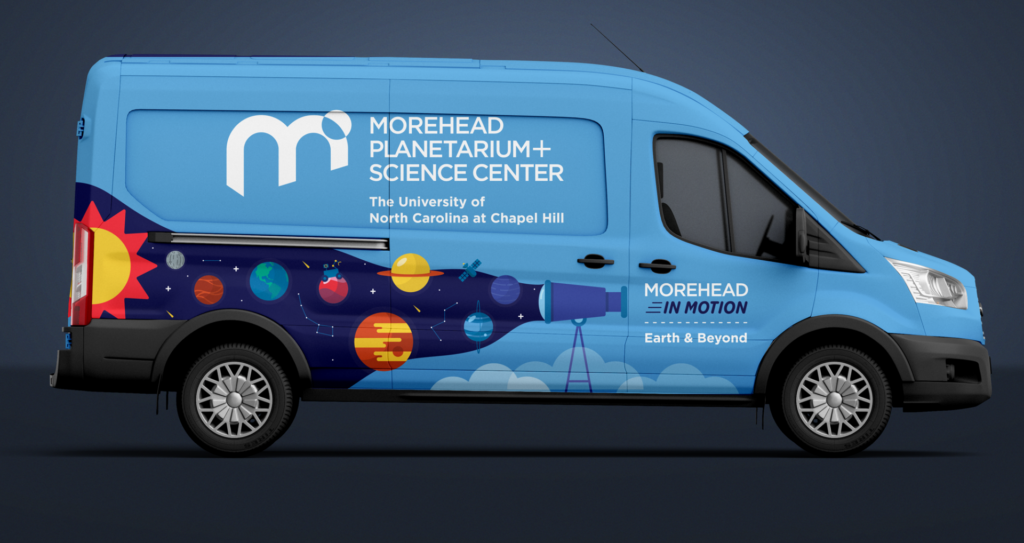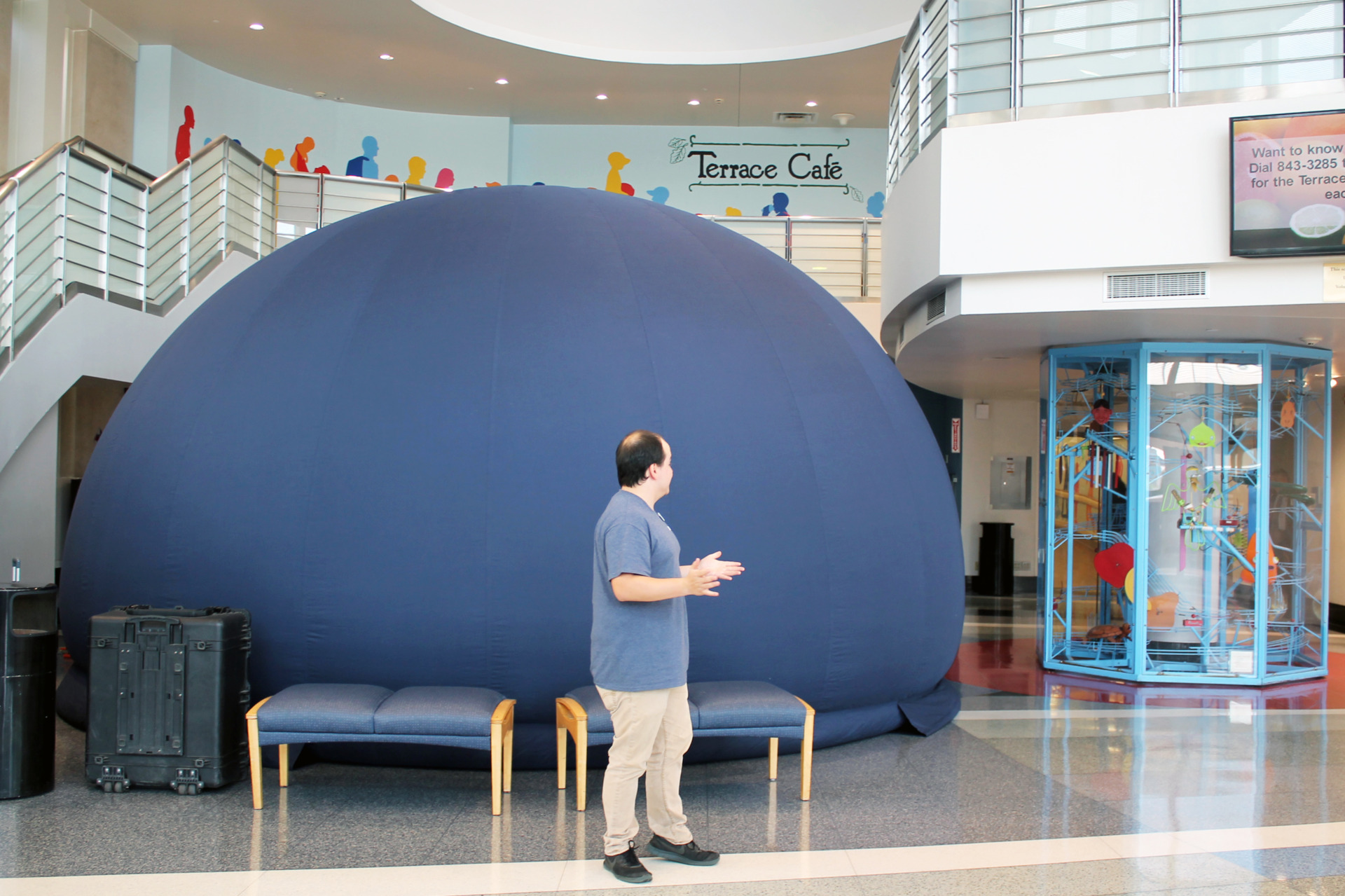Morehead in Motion: Earth & Beyond
Requests for the 2024-25 school year are now open.

Explore earth science and astronomy in our new at-your-school program
In this mobile Morehead program, students participate in NCSCOS-aligned lessons that explore earth science and astronomy concepts. Students explore moon phases and light, learn to map planetary surfaces, hunt for exoplanets, and much more!
Earth & Beyond program offers 3 choices for your school: 1) Classroom Program, 2) Mobile Planetarium visit, or 3) Combo Classroom Program + Mobile Planetarium.
Earth & Beyond: Classroom
For Grades K-12
Length: 60 minutes
Maximum participants: 30 students.
Maximum sessions: 2 per day
Recommended for Kindergarten through Grade 2.
Earth Science | Have you ever wondered how clouds and rain are formed in the Spring? How can wind blow the leaves from the trees in Autumn? How does water change into delicate snowflakes and hazardous ice in Winter? A Year of Weather helps students visualize the fascinating and varied changes in our atmosphere throughout the seasons.
Educators can pair this lesson with any of the following mobile planetarium shows:
Recommended for Kindergarten – Grade 2.
How do people observe objects that are far away? Students will practice their observational skills to compare how the views we see are different when we use our eyes and when we use tools like a telescope and binoculars.
Educators can pair this lesson with any of the following mobile planetarium shows:
Recommended for Grades 3-5
What do maps help us learn? How can you learn about a planet that is covered in clouds? What kinds of tools do you need? Students will explore ways that NASA and other space agencies use satellites and other spacecraft to indirectly map the surfaces of planets – including our own Earth!
Educators can pair this lesson with any of the following mobile planetarium shows:
Recommended for Grades 3-5
Have you ever wondered what scientists look for when we explore other planets? What features do we use to help classify things in our solar system? What in the world happened to Pluto?!?! Explore these concepts and more through hands-on activities and visualizations to classify objects in our solar system, indirectly map a planet’s surface, and help solve an inter-planetary mystery.
Educators can pair this lesson with any of the following mobile planetarium shows:
Recommended for Grades 6-8
What is the difference between climate and weather? What is climate change? How do we track the cycling of water and gases in our own atmosphere? This activity will help students connect with the global concept of climate while using meteorological models and NASA visualizations to track the vital signs of our planet — including carbon released into the atmosphere.
Educators can pair this lesson with any of the following mobile planetarium shows:
Recommended for Grades 6-8
Is there another planet like Earth out there? Are there other solar systems besides our own? How can we see things that are so far away? Students will tackle these questions using NASA data and visualizations and will explore some of the thousands of planets outside of our own solar system. Classifying these otherworldly planets can help us gain better insight into planet formation and some of the mysteries of our own Solar System.
Educators can pair this lesson with any of the following mobile planetarium shows:
Recommended for Grades 9-12
How does human activity affect our oceans and seas? How do scientists measure changes in the health of the ocean? How does this affect us in North Carolina? As future scientists, students will perform pH assessment to learn about ocean acidification and use NASA Earth Science data to track the potential path for rising sea levels.
Educators can pair this lesson with any of the following mobile planetarium shows:
Recommended for Grades 9-12
How are we able to look so far back into space and time? How does light travel and how do we capture it? How does this journey inform our knowledge of the universe? Where do black holes lead? Students will explore how the Hubble Space Telescope, the upcoming James Webb Space Telescope, and other observatories use the electromagnetic spectrum to give us a brighter picture of the matter and structure of the universe. Through exploration of wavelengths, students will understand how beautiful astronomical images come to life.
Educators can pair this lesson with any of the following mobile planetarium shows:
- Phantom of the Universe
- Cosmic Colors
- We are Stars
- Exploding Universe

Earth & Beyond: Mobile Planetarium
For Grades K-12
Length: 45 minutes
Maximum participants: 20-30, dependent of participating grades
Maximum sessions: 4 per day
Learn MoreMorehead’s planetarium shows have been adapted to be digitally displayed in the mobile planetarium. Shows are paired topically based on Earth & Beyond classroom lessons.
Live shows are narrated by a Morehead educator and are designed especially for Morehead’s mobile planetarium. The live format encourages questions and allows you to pace the show for your classroom needs.
Classroom Visit*
- Daily Rate: $425
- Maximum number of sessions: 2 per day
- Session Length: 45-90 minutes
Mobile Planetarium
- Daily Rate: $500
- Maximum number of sessions: 4 per day
- Session Length: 45 minutes
Classroom + Mobile Planetarium
- Daily Rate: $630
- Maximum number of sessions: 2 classroom programs, and 1 planetarium show (or vice versa).
- Session Length: 1.5 – 2 hours
Travel Fees
- Sites more than 90 miles from Chapel Hill: $0.10 per mile, to and from site location.
- Reservations requiring overnight stay: $250/day
- All travel fees are calculated using Google Maps.
Scholarship assistance is available pending qualifications.
- A staff member must also be present to greet the educator when they arrive at your school. This person should be available to help unload and set up.
- If your visit is for one day, the lab must be in the same location all day. If your visit is for multiple days, the lab should remain in the same location for each day.
Mobile planetarium
Maximum capacity**
Kindergarten – 3rd Grade: 30 students
4th Grade – 7th Grade: 24 students
8th Grade – 12th Grade: 20 students
School requirements:
- Teacher must be present during shows.
- Schools 90 miles from Chapel Hill or Tier 1 (low wealth) school districts receive priority for mobile planetarium visits.
- Sites more than 90 miles from Chapel Hill will require a $190 travel fee plus .10 per mile.
Site requirements:
- Quiet indoor room.
- Minimum floor space: 30 feet by 30 feet.
- Minimum ceiling height: 13 feet with no obstructions (light fixtures, etc.)
- 2 grounded 120-volt standard electrical outlets.
- Clean, swept floor.
- Air conditioning (required May-Sep.)
- Adjustable lighting (when available)
- For multi-day visits, the mobile planetarium must remain in the locked facility.
**Mobile planetarium capacity varies by age group. The mobile planetarium can also accommodate two adults in addition to student participants.
Visits canceled two weeks prior to visit date are eligible for a refund of fees. Visits canceled less than two weeks prior to visit date are not eligible for a refund of fees. Morehead may waive this policy if the visit is canceled due to school closure for inclement weather, fire or other emergency condition.
Nick Eakes | Science Programs Outreach Educator
neakes@live.unc.edu
919.962.8438
